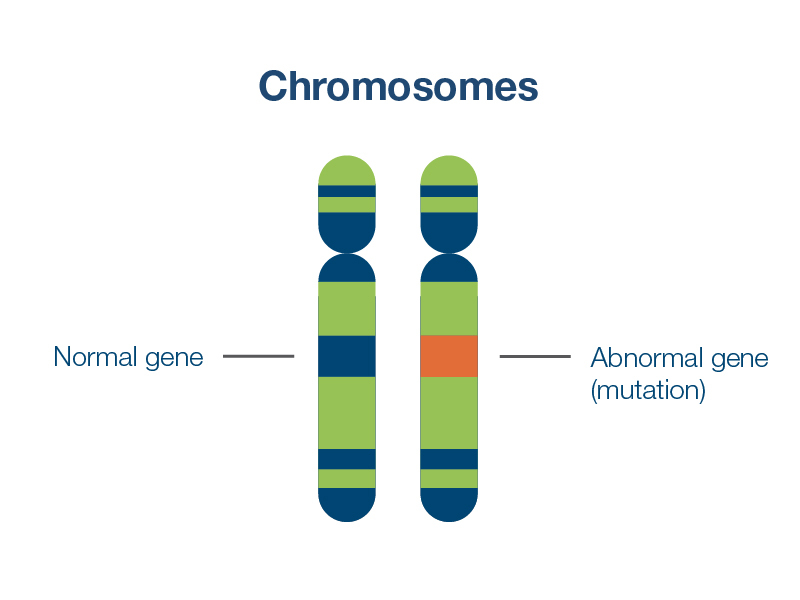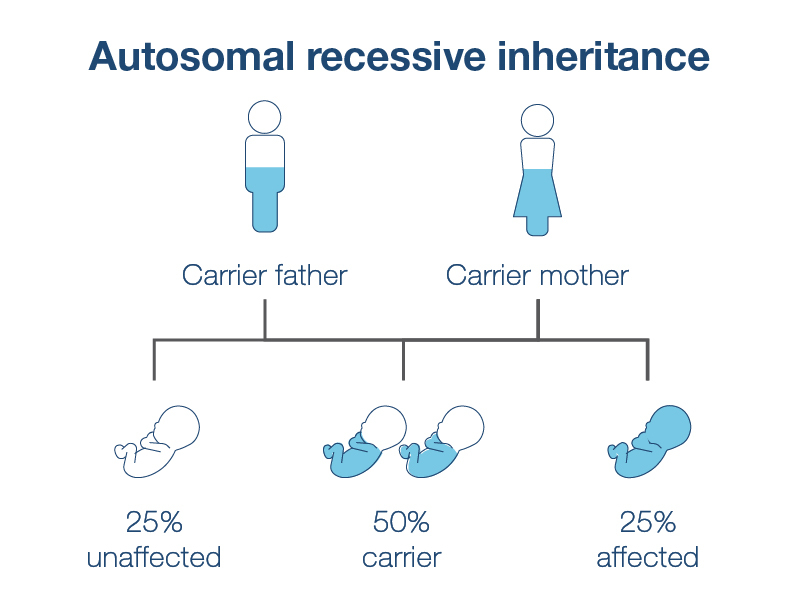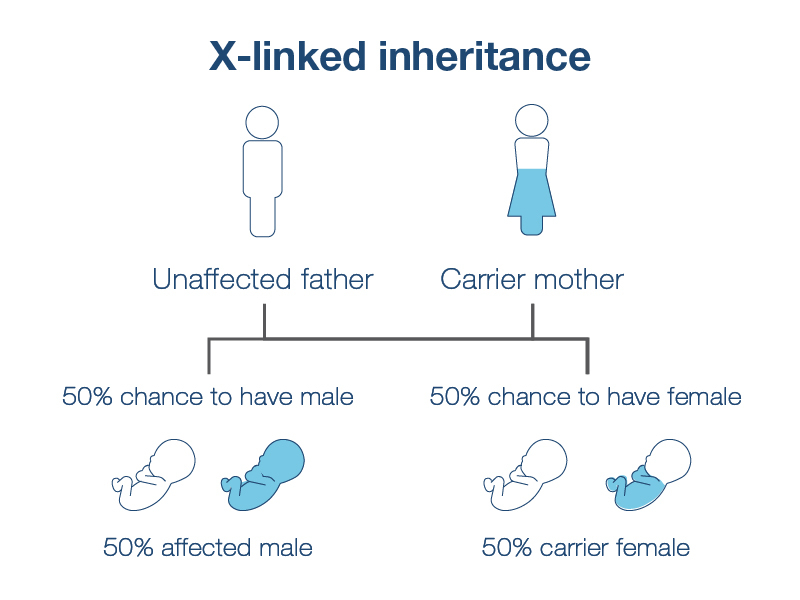Corrine’s Journey From Fear to Empowerment—Carrier Screening for Informed Pregnancies
Corrine was 8 weeks pregnant with her first child when she learned about carrier screening—a test that looks for altered variants in genes that can cause certain inherited genetic conditions. As part of her pregnancy care, she had a routine carrier screening test, which came back negative. But at 12 weeks when Corrine’s genetic counselor (GC) learned that her husband is of Jewish descent, a group at higher risk for certain genetic conditions, the GC recommended additional screening with Horizon™.
Shocking News
Horizon revealed that Corrine and her husband were both carriers for genetic variants that cause cystic fibrosis (CF), a recessive genetic condition that causes chronic lung infections, problems with digestion, and significantly shortens the lifespan. One in every 25 people of European descent are CF carriers.1 The genetic variant that Corrine carries is a rare version that the standard carrier screen had missed.
CF is considered a recessive genetic condition—it occurs only when altered variants of the same gene are inherited from both parents. To develop CF, children must inherit altered variants in a specific gene, the CFTR gene, from both parents. People carrying a CF variant in only one of their two copies of the CFTR gene are known as CF carriers. CF carriers do not have CF themselves, but they can pass the condition on to their children.
When both parents are CF carriers, as in Corrine and her husband’s situation, each of their children have a 1 in 4 chance of having CF, and a 1 in 2 chance of being a carrier.
Learning that her first child was at risk for CF months into her pregnancy came as a shock for Corrine.
“It was a really hard, dark time for us. If I’d known that we were both carriers for CF before getting pregnant, we would have done our research and been able to go over all our options to have a happy and healthy baby. It was devastating to learn our child could potentially be impacted.”
Additional prenatal diagnostic testing showed that Corrine’s son did not have CF, but the waiting period was stressful and frightening for Corrine, and made her wish that she had been told more about carrier screening prior to becoming pregnant.
“I had no idea there was such a thing as a carrier screen that I could have done prior to becoming pregnant. Why didn’t we know about genetic testing before we got pregnant? Doctors should ask their patients about it before they get pregnant. It’s just a simple test.”
What Is Carrier Screening?
Carrier screening is a type of genetic testing that tells people whether they are carriers of certain inherited genetic conditions they could be at risk of passing on to their children.

Most of these genetic conditions are what is known as autosomal recessive diseases. People carry two copies of most genes. Autosomal recessive diseases only occur when changes in a specific gene are inherited from both parents—that is, when both copies of the gene are affected. Cystic fibrosis is an example of an autosomal recessive disease. Sickle cell anemia is another.

For recessive autosomal diseases, couples who are both carriers have a 1 in 4 chance of having a child with that condition. However, the likelihood of both parents screening positive for the same genetic condition is very small – less than 1%.
Carrier screening also tests for what are known as X-linked genetic conditions, genetic conditions caused by genes found on the X chromosome. Fragile X syndrome, which causes intellectual disability, behavioral challenges, and a range of physical characteristics, is an example of an X-linked genetic condition. Hemophilia A, a bleeding disorder, and Duchenne muscular dystrophy, a degenerative muscular disorder, are also X-linked genetic conditions.

Like other recessive genetic conditions, X-linked genetic conditions generally do not impact someone who also carries an unaffected copy of the gene. Because biological females carry two X chromosomes, if they are a carrier, they typically still have one functioning copy of the gene and are not affected by the condition. If their biological mother is a carrier, female children have a 1 in 2 chance of also being an unaffected carrier of the X-linked genetic condition.
Biological males, however, inherit one X chromosome from their biological mother and one Y chromosome from their biological father. Because males only have one X chromosome, if they inherit a genetic defect on their X chromosome, they develop the recessive genetic condition. Thus if their biological mother is a carrier for an X-linked genetic condition, the chance a male child will inherit and be affected by the condition is 1 in 2.
How Horizon Made a Difference
Corrine’s initial carrier screening with a standard panel came back negative. However, since certain recessive genetic conditions are more prevalent in people of Jewish descent, Corrine’s GC recommended expanded carrier screening with Horizon™ upon learning her husband’s background.
Horizon screens for over genetic conditions, including cystic fibrosis, spinal muscular atrophy, fragile X syndrome, and sickle cell anemia. Horizon also screens for multiple genetic variants that could cause each condition, so it works effectively for people from any ethnic background.
Horizon leverages next-generation sequencing technology to screen for a large number of conditions, going beyond traditional tests to detect more carriers. Horizon includes complimentary information sessions with board-certified genetic counselors before and after testing.
Corrine found that working with a board-certified genetic counselor made all the difference during this difficult time.
“My Natera genetic counselor was with us every step of the way. She guided us through unknown territory and went above and beyond to make sure that we understood everything and that we felt comfortable.”
What Is the Value of Carrier Screening?
The American College of Obstetricians and Gynecologists (ACOG) currently recommends that all pregnant individuals receive information about genetic carrier screening, and that carrier screening and counseling should ideally be performed before pregnancy.1 Family medical history is not a reliable indicator of carrier status, as the majority of carriers have no family history of those genetic conditions.
When carrier screening is performed before pregnancy, parents receive information that may help shape their path to conception. Learning their carrier status ahead of time enables them to decide whether they want to pursue alternative paths to pregnancy, such as in vitro fertilization (IVF) with preimplantation genetic testing (PGT), or to request additional diagnostic testing after becoming pregnant.
Carrier screening during pregnancy helps parents decide whether to pursue prenatal diagnostic testing to learn if their baby has a specific genetic condition and can also provide them with extra time to prepare emotionally, medically, and financially for a baby with that genetic condition.
Genetic Carrier Screening with Horizon
Horizon carrier screening gives families information about genetic risks to empower them to make more informed reproductive decisions. The process is simple—it requires only a saliva sample or a standard blood draw. After the sample is received, results are typically available in two weeks.
Learn more about Horizon here.
References
1Grody, W., Desnick, R. Cystic fibrosis population carrier screening: Here at last—Are we ready?. Genet Med 3, 87–90 (2001).
2Carrier screening for genetic conditions. Committee Opinion No. 691. American College of Obstetricians and Gynecologists. Obstet Gynecol 2017;129:e41–55.
